HOME | ABOUT US | MEDIA KIT | CONTACT US | INQUIRE
HOME | ABOUT US | MEDIA KIT | CONTACT US | INQUIRE
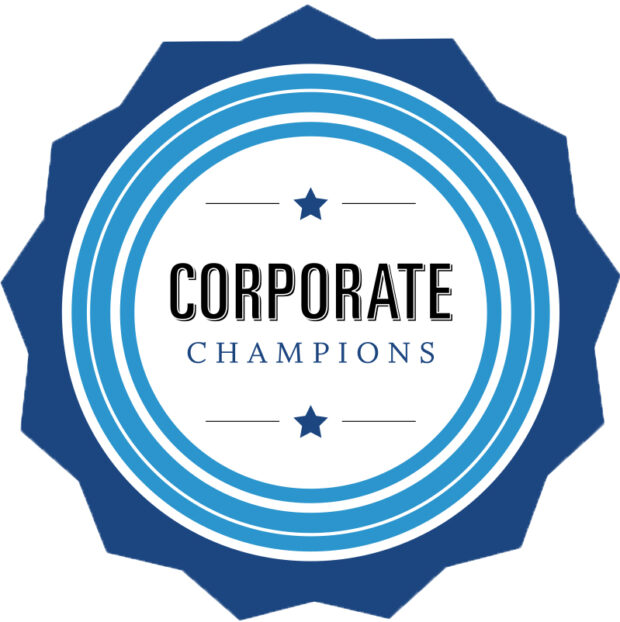
If you want to know what really makes business in the greater Kansas City area something special, take a look at Ingram’s 2017 Corporate Champions and those organizations that precede them. Tell us what you see. Yes, a list of companies that are among the region’s best-known brands. And some you might not really know much about at all. Some are billion-dollar giants; some are much smaller firms you don’t hear much about. Some are service businesses; some of them make things.
The connection between them is that, along with these Corporate Champions, more than 50 companies combined, including previous honorees over the past decade, jump out of their shoes when it comes to corporate philanthropy and engaging their staffs in charitable acts that make Kansas City a better place to live.
We think there’s a value in showcasing their contributions— there is reason to believe that their example can inspire others to elevate their own game when it comes to sharing the blessings that can come with running a successful business. Character, it’s been said, can be defined as doing the right thing when no one is looking. Or, in some instances, when everyone is looking. Every company, including alums, is on the Corporate Champions roster not because they reached out to us for some organizational horn-tooting, but because someone in the broader business community went to the effort of contacting us and said, “Hey, look what these remarkable folk are doing.”
Ingram’s editors also keep a close eye on companies throughout the region that give far more than they take. We believe that shows character and this city is better off because of their great works. So we continue to search. And we’re particularly impressed with these six organizagtions the committee selected to honor this year. We were honored to recognize this year’s Corporate Champions at a heartfelt Philanthropy Awards celebration on Dec. 12. We hope, through sharing their stories and experiences, that you will be equally impressed. And inspired to follow their lead.
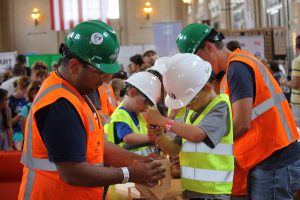
For the Kids | JE Dunn employees assisting children at the Maker Faire.
Steve Dunn has a story to share about his grandfather, JE Dunn Construction founder, John Ernest Dunn. “When he gave, he liked to keep it quiet,” says Steve, the chairman of the company. Example: Not long after John Ernest died in 1964, the principal from a nearby grade school came by the company offices, offering thanks for what the founder had done by “adopting” students there—“making sure they had enough to eat, that they had coats, proper clothing and shoes, and how he worked with the principal because he wanted to make sure these kids were taken care of,” Steve says. It was a powerful lesson half a century ago, and it’s being embraced today to new legions of Dunn employees. “It’s always been ingrained in us, that if we’re fortunate enough to be successful and to prosper, you do have an obligation to give back,” said Terry Dunn, who succeeded his father, John Ernest’s son Bill Dunn Sr., as CEO. That value system was a touchstone during the company’s growth before his own retirement in 2013. “It started in Kansas City, and as we’ve become a major national contractor, we have refocused that throughout the country,” Terry said. “The opportunity for employees to commit time, talent and treasure exists in every in each of the company’s 20 offices nationwide.” Perhaps most impressive is the company commitment to donate at least 10 percent of its pre-tax profit to charities. In board roles and roll-up-the-sleeves volunteer efforts, employees support non-profit efforts for educational and youth development, health-care research, sustainability efforts, religious groups, arts and cultural foundations—more than 300 philanthropies last year alone. The Dunn Family Foundation, founded in 1981, focuses on the arts, civic initiatives, programs for the disabled, economically disadvantaged and youth and elderly, education, diversity, health care and faith-based institutions. “That’s kind of a shotgun approach; most foundations have a rifle-scope approach to what they support,” says Bob Dunn, the foundation’s executive director. “But we see a great deal of needs in this community, and we try to be a part of the solution, not a part of the problem.”
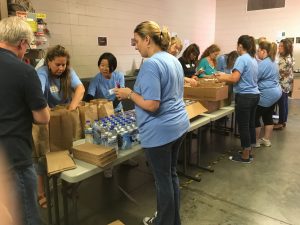
Cheers | Bayer employees working the filling line for the food bank at Harvester’s.
At Bayer Animal Health, employees know what it means to serve their fellow man. And about serving their fellow man’s best friend, too. “Take the Rose Brooks Center,” says Joyce Lee, president of the North American operations based in Shawnee. “We’ve worked with them for years and we’re honored to continue supporting their pioneering efforts to help domestic violence survivors heal alongside their beloved pets.” That included recent efforts to build a shelter within a shelter at the Rose Brooks Center, a refuge for those fleeing domestic violence. Susan Miller, executive director at Rose Brooks, called that a powerful gift, because women might otherwise be compelled to choose between their own safety and that of their pets at home. “We also contribute to local animal-welfare organizations that allow families to adopt healthy dogs and cats,” Lee said, with Wayside Waifs’ Strutt With Your Mutt annual 5-K run and 3-K walk, a favorite for Bayer employees. “The event allows us to get out and have a little fun while also helping to fund the local animal sheltering community,” she says. Those tactics are part of an overall strategy of corporate social responsibility. It’s especially fortuitous, she said, that Bayer sits in the epicenter of the Kansas City Animal Health Corridor. That allows Bayer to support advances in research and innovation in the animal-health industry while also helping to grow the local economy by solidifying this region as an animal health business hub. Bayer’s largesse includes providing every U.S. employee with the equivalent of two paid work days every year to volunteer. This year, Lee says, “the company launched a nationwide pilot of Bayer Day of Service and our Animal Health site was part of the program.” More than 100 employees joined colleagues from Bayer Crop Science to volunteer across the region. They donated more than 400 hours of service to six local non-profits, including Wayside Waifs, Kids TLC, Harvester’s, Rose Brooks Center, Habitat for Humanity and the Girl Scouts Camp Prairie Schooner. “They did everything—from making dog treats, to repairing cabins, to packing meals.” “I’m proud to work with such a wonderful group who are not only dedicated to their jobs but also dedicated to making a positive impact in our neighborhoods.”
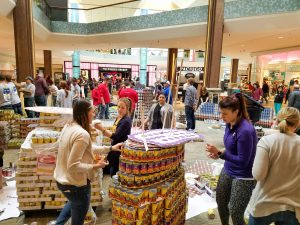
Can-Do Attitude | Employees from Populous at the CANstruction competition.
There are plenty of reasons to be impressed by corporate philanthropy at the design firm Populous, but among the most impressive is sheer depth. Start with the Turn The Page reading program—the firm contributes 60 weekly volunteer readers and has stepped up with a three-year, $100,000 sponsorship. Some might consider that alone as going above and beyond the call of corporate citizenship, but take a deep breath and try to get through this list of other organizations it supports with manpower and money: the ACE Mentoring volunteers program, the MLB Urban Youth Academy, CANstruction (a benefit for Harvester’s), the KC Collection Art Program, Cells for Cells (benefitting the Leukemia & Lymphoma Society, and sponsorships with the Nelson-Atkins Museum of Art and the National World War I Museum. It also has a match program for donations and volunteer time with Big Brothers Big Sisters of Kansas City, Children’s Mercy, Habitat for Humanity, Harvesters, Lead To Read, the Make-A-Wish Foundation, Ronald McDonald House, Special Olympics, Wayside Waifs and the Wounded Warrior Project. Want more? How about $10,000 set aside for the employee philanthropy committee to offer matches at offices in Boston, New York, Pittsburgh, Denver and San Francisco, and both financial support and staff time for guest lecturing at design programs at both KU and K-State. “We have always focused strongly on community engagement,” says managing principal Earl Santee, one of the firm’s founding partners. “We have developed numerous initiatives to encourage donations and volunteering throughout our growth as a firm. … We love the diversity of community programs offered in Kansas City. It’s important to who we are as a firm that we foster a strong sense of community responsibility in each of our offices as we continue to grow.” The youth academy, he says, has a special place for employees of a national sports architecture firm. “It will make its public debut next spring,” Santee says, “and the MLB is already calling it the best Urban Youth Academy yet.” With baseball and softball fields and a central recreation center, he said, it will provide the infrastructure for multiple youth sports program and help instill youth leadership and teamwork skills.
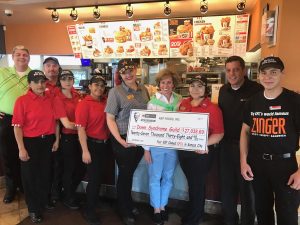
Serving It Up | KBP employees who feed and finance Down Syndrome Guild events.
Several years ago, after joining KBP Foods, Anthony Gianino got his first look at the company’s ability to support charitable events. It was the Step Up for Down Syndrome Walk at Arrowhead Stadium. “When I first pulled up and saw this entire lot at Arrowhead with tons of people, cars and tents set up, realizing we were going to have to feed all those—I felt like it was going to be impossible,” he recalls. But within minutes, an army of vans rolled in, the food rolled out, and the participants began to line up. Just 90 minutes later, roughly 20,000 pieces of chicken, plus sides, were history. “It was … flawless,” Gianino says. “Teamwork at the highest level of execution.” Not many big national franchise organizations would take on something like that; most would run the numbers before making that level of commitment. “But cost did not enter into the decision,” he said. That was his introduction to CEO Mike Kulp’s overarching goals for corporate philanthropy. The Down Syndrome Guild, Kulp said, “was one of the first organizations I personally became involved with, and it stemmed back to my upbringing. My mother taught severely emotionally and disabled children for a lot of years, more than 40.” Over the years, Kulp has been pleased to see the Down Syndrome Guild evolve, and sitting on its board changed him, too. “I saw first-hand the benefits of becoming really involved in an organization like that,” Kulp said. “The value of not only the dollars, but the service work and volunteer time.” And that experience has helped frame a national strategy for one of the region’s fastest-growing large companies, where each new market entered is viewed as a distinctly separate set of philanthropic opportunities. “Just in the time I’ve been here,” Kulp said, “we’ve grown from 150 to nearly 600 restaurants. We structure our operations teams, have a team leader on the ground tasked with finding that local charity that we can be a really big part of, and a meaningful part of what they do. We want to be more than a drop in the bucket for them.”
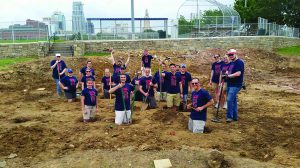
Hole-Hearted | Staffers from the accounting firm spruce up a Downtown park.
The story of corporate philanthropy at MarksNelson is as instructive as it is inspirational. A few years ago, the owning partners looked ahead to a wave of looming retirements approaching with key members of the accounting firm’s partners and top producers. The first choice was to remain independent. The second was to find innovative ways to place greater emphasis on quality of life and create a culture of kindness. From that, in 2015, came the MarksNelson Marks of Kindness program, formalizing its commitment to civic responsibility through community outreach projects, and providing the work force with opportunities to serve the community, executives say. “What really sets our Marks of Kindness program apart is that it isn’t just about fundraising but about our employees getting involved and personally doing something that makes an impact,” says Mark Radetic, the managing partner. “We have our own Marks of Kindness programs and we support nonprofits by providing time, expertise, sponsorships, and donations. Many of the nonprofits we support are suggested by our employees.” Once a year, the firm closes for a day and our entire workforce fans out across the city to donate services to selected non-profits—11 in all for the 2017 version of Volunteer Day. The firm also encourages employee participation by setting goals and turning the team loose; in one case, raising funds to put 80 televisions into service at the Ronald McDonald House. The firm primed that pump by giving every employee $10 and challenging them to find ways to turn that into additional capital to help reach the goal. Result? They met the three-year goal in just two. Last year, the firm launched Wrapped in Warmth and asked employees to donate scarves, hats, and gloves for the homeless. Then staff members tied those donations—412 in all—and by turning the program outward to include clients, will nearly quadruple the girft this year. It also raises funds with employee Dress Down Days, contributed pro bono services to dozens of non-profits, and encourages board service and other volunteer efforts by the staff.
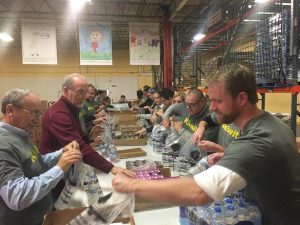
Preparing to Feed the Masses | Employees volunteering for Kiewit Feeds Kansas City.
One might fully expect that the nation’s fifthlargest contracting and engineering company, with $8.6 billion in sales for 2016, would have a highly strategic approach to corporate philanthropy. And, in the case of Kiewit Corp. and its Lenexa subsidiary, Kiewit Power, one’s expectations would be fully met. The Kansas office is one of nearly 50 locations the Omaha company has across North America, and like each of the others, it has a structured approach to giving that is both broad and deep. For starters, Kiewit Power has a pair of signature events that speak to its fund-raising strengths. One is the Power of Hope golf Tournament, a fund-raiser to support research in childhood cancers; last year, it generated an impressive $400,000 toward that end. The other runs during the holiday season, in November and December, as more than 450 professionals from the firm volunteer at Harvesters as part of the 2017 Kiewit Feeds Kansas City initiative. On another level, the company’s large-sponsorship initiatives steered more than $26,000 to Children’s Mercy Kansas City’s Red Hot Night event, raising its five-year running total to more than $114,000 for that event alone. And Kiewit also kicked in $25,000 to sponsor the American Heart Association’s 2017 Heart Ball. Education gets a slice of the philanthropy, with the Olathe and Blue Valley Educational Foundations, and the Blue Valley CAPS program, earning sponsorships or grants; others receiving sponsorship dollars included CASA of Johnson and Wyandotte counties, the Cystic Fibrosis Foundation, Hope House, the Missouri VFW and Vietnam Veterans of America. All of that is supplemented with a long roster of communityinvolvement projects, with the women’s affinity group being particularly active in benefits for Boys and Girls club, Girl Scouts, Introduce a Girl to Engineering Day and Kansas City Community Kitchen. Various departments chipped in for Christmas in October, meals prepared and served at Ronald McDonald House, school volunteer services and gift cards for a domestic violence shelter. And all of that from just one office. Multiply that by nearly four dozen locations from the beaches of Hawaii to the Canadian shores of Newfoundland, and the true magnitude of the Kiewit commitment starts to come into focus.